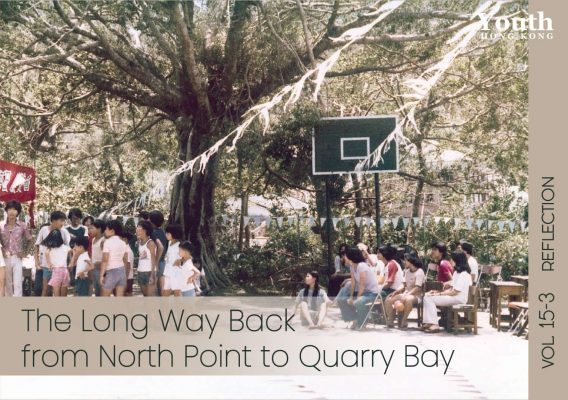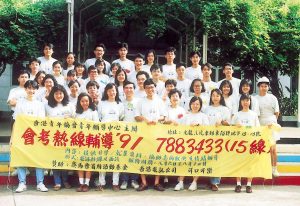//vol.15-3 Reflection
The Long Way Back from North Point to Quarry Bay
the Past and Future Hong Kong’s Youth Services
by Andy Ho
In the bustling streets of Hong Kong Island back in the 1980s, Andy Ho joined the Federation stationed at North Point Estate, a 11-storey public housing complex that now lives only in memories. After a long and stellar career, he retired as the Executive Director in 2023 at his office located in Quarry Bay, a short distance away from where he started. In those 36 years, he has witnessed many changes and shares his journey.
Play
When I look at the old blurry photographs from the early days of the Federation, I see a huge hall but few youth service workers. I imagine that during this period, especially the late 1950s and 60s, when there was a large influx of immigrants, the purpose was to provide a safe space for young people to gather. Providing an area where they could enjoy leisure activities seemed to be the priority. I suppose this was understandable, given the rather harsh living conditions of the time, when everyone was just working hard to secure a good future.
As Hong Kong began to develop as a city, there was a marked shift in how youth services were perceived. No longer just offering a “place to play”, services began to include the rendering of assistance and support. I would say that the establishment of the Youth Counselling Service was a turning point for us. We took a proactive stance in looking at youth challenges, and there was much discussion and debate on, firstly, how we looked at young people; and secondly, what we could do for young people. With public seminars and conversations, crucially, even the government began to offer its support to youth services.
Problems
During the 70s and 80s, public opinion still considered things as “youth problems”, seen as young people struggling with problems, or causing problems. The prevailing policy was to deal with the present and immediate issues. It was like putting a “band aid” on a wound, looking at quick solutions. A little like today’s medical treatment model, there was no urgency in strategic thinking or long term planning.
Ironically, this was also a boom period, with the establishment of over 30 youth centres. There was also the adoption of a more professional and systematic approach to “problem-solving”. Towards the end of the 80s, the focus changed to a more holistic development of young people, through the initiation of youth exchange projects and educational services. This was a major shift in analysis as young people were no longer “objects” to receive services, but “subjects” to whom services were specifically being addressed for a more sustainable end.
Potential
By the turn of the century, these gradual shifts became more entrenched. Youth services began to consider young people with potential, energy and an ability to contribute back to the community beyond just as volunteers. This was an exciting period as the development approach model took root. Young people were now clearly seen as a resource for society and the services being offered by the Federation also began to explicitly harness, encourage and develop talent. Even the concept of youth centres began to evolve to Youth S.P.O.T.s (青年空間), signifying a shift in approach from “service oriented” to “youth oriented”. Instead of simply being areas of “play”, they became spaces (空間) for participation, opportunities, training, discovery, learning and engaging.
We also began to consider preventative measures in some of our services. For example, when the HKFYG Youth Crime Prevention Centre was set up as one of our core services, the purpose was not only to take remedial action, but to address the issue proactively.
Partners
In 2008, the Federation, whose many services had been scattered all over the city, brought together all the administrative units into a new building in Quarry Bay. This might seem like an insignificant step, but it was a big step for us. We now had a visible corporate identity and young people were seen more as partners, than just recipients, through our 12 Core Services.
The next 15 years also saw a distinct shift in the ways that young people saw themselves. They began to question convention and the customary way of doing things. This was a generation brought up in relative prosperity and their challenges and concerns were very different from previous cohorts. They were self-confident in expressing their political, social and economic opinions and they were less inclined to accept conventional nine-to-five jobs. They were technologically attuned and sought diversity and flexibility in education, employment, and even lifestyle. They were concerned about the planet and the environment, and being digitally connected, their perspective was global.
These changes did not pose a serious problem for the Federation, in that we had a clear and proactive approach to services. By anticipating the future skills that they needed, as well as providing them opportunities to express themselves and engage as responsible citizens, we were able to stay relevant.
Pioneers
By the time the Covid pandemic hit, we could adapt. Online and then later, hybrid, became part of everyday vocabulary. Volunteering reached a peak as young people assisted those isolated or in need. While the real cost of lack of face-to-face interaction is not yet fully known, struggles with emotional, mental and physical well being really came to the fore.
As we navigate these challenges, as well as those of an ageing population, limited social mobility, migration and talent shortages, we will need to be pioneers in providing pertinent services. We also need to connect the youth of Hong Kong with their peers on Mainland China in a way that brings prosperity and positivity to both sides.
Promise
One can say that it took me 36 years to walk the 10 minutes from my first office in the North Point Estate to my first office in the HKFYG Building in Quarry Bay. And as I was then, I am now optimistic for the future, because I have seen the trajectory of our youth services as a reflection of the city’s journey – from challenges to empowerment, from problem-solving to potential-realisation.
If we can continue to hold close the values of commitment, trust, unity and progress (信念、信任、團結、向前) close, and if we can continue to be steadfast in our mission to youth services, I believe that we will be able to handle whatever comes our way. ■








